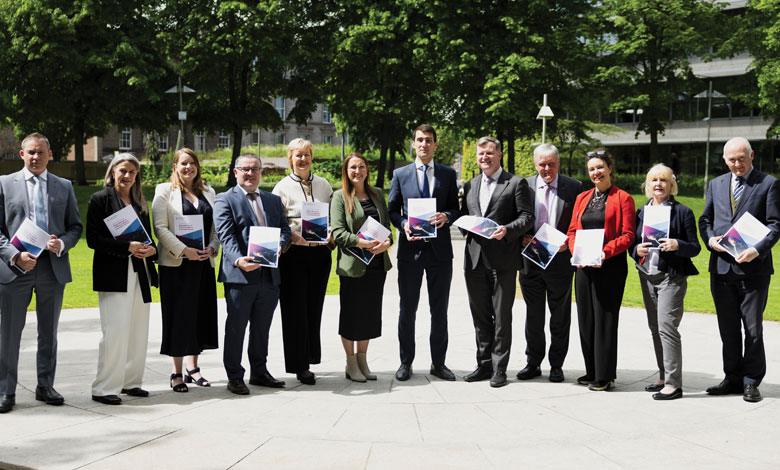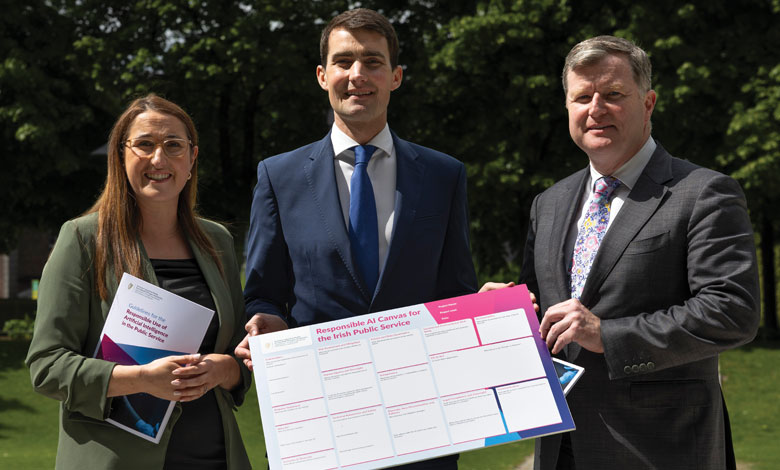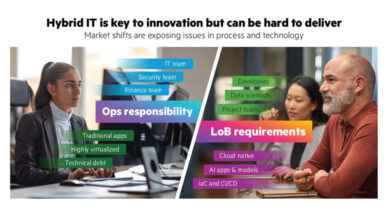Shaping the future responsibly

Artificial intelligence (AI) is no longer a distant reality. It is already shaping how we live, our economies, and crucially how governments serve their people.
Across the globe, AI is being adopted to improve decision-making, streamline operations, and deliver better outcomes for citizens. In Ireland, its potential is already being realised in areas such as healthcare diagnostics, predictive analytics, and natural language processing for better public engagement.
But with great power comes great responsibility. The emergence of AI has raised important questions about trust, fairness, accountability, and transparency. This resonates especially when it comes to its use in the public sector. The Irish Government recognises the need to harness AI’s potential while maintaining public trust and safeguarding human rights. That is why the recently published Guidelines for the Responsible Use of Artificial Intelligence in the Public Service by the Department of Public Expenditure, Infrastructure, Public Service Reform and Digitalisation mark a significant and timely progression.
Why do we need guidelines?
AI can support better and more efficient public services. But without careful oversight, it can also reinforce existing biases, lead to opaque decision-making, and diminish public confidence. These risks are particularly acute in the public service, where decisions directly affect citizens’ lives, entitlements, and access to essential services.
Better Public Services (2023) is the transformation strategy aimed at delivering for the public and building trust. It sets a clear ambition: to deliver more user-centric, integrated, and inclusive public services. AI, when used ethically, can help realise that vision. However, the strategy also emphasises the importance of responsible innovation by ensuring that the deployment of new technologies does not compromise values such as equity, transparency, and accountability.
The Guidelines serve as a critical safeguard, providing a structured framework to guide Public Bodies in the responsible and ethical use of AI. They ensure that innovation does not outpace governance, and that public trust is maintained as technologies evolve.
What do the Guidelines hope to achieve?
The Guidelines have been designed with several key objectives in mind:
- Promote trust and transparency: Citizens need to understand when and how AI is being used in public services. The Guidelines call for clear communication, transparency of processes, and explainability of AI-driven decisions.
- Ensure accountability: Public sector organisations must be able to account for how AI systems are deployed, including who is responsible for their operation, oversight, and outcomes.
- Support fairness and inclusivity: AI systems must be free from bias and designed to avoid unintended discrimination. The Guidelines encourage ongoing monitoring to ensure fairness.
- Foster innovation safely: Rather than stifling innovation, the Guidelines provide a structured path for Public Bodies to experiment responsibly. This ensures that ethical risks are identified and mitigated early in the development cycle.
- Align with European and international norms: The Guidelines are informed by emerging EU regulation, including the EU AI Act, and best practices from international counterparts, ensuring Ireland’s approach is aligned with global standards.

How do we ensure the Guidelines are accessible?
Accessibility is not just about format; it is about understanding and relevance. From the outset, the development of the Guidelines has been grounded in consultation with a wide range of stakeholders from across the Public Service and academia. This collaborative approach ensures the Guidelines are practical, usable, and resonate with the realities of public service delivery.
The Guidelines have been structured to be easily navigable, with clear principles, practical checklists, and case studies to help users apply them in real-world settings. Contained within the Guidelines is a Decision Framework which can be used as a guide for public service workers when considering using AI to solve a problem or improve a service.
This framework will help evaluate if AI is the most suitable solution for our needs. The Guidelines provide a user-friendly Responsible AI Canvas. The Canvas is a simple, structured tool, designed to help Public Service workers develop, implement, and oversee responsible AI solution.
What supports are available to public service bodies?
Additional supports are available to ensure the successful implementation of the Guidelines. These include:
• Training and capacity building: The Institute of Public Administration offers a number of courses catering to all levels in AI. A bespoke training course is available which has been specifically curated for the Guidelines.
• The Centre for Applied Data Analytics (CeADAR) serves as the European Digital Innovation Hub (EDIH). CeADAR offers access to funded specialist training and upskilling, scope proof of concept solutions and develop and test prototypes, understand how your organisation can benefit from analytics and AI and conduct project feasibility work designed to minimise the barriers to technology adoption.
• Guidance on the use of Cloud Computing and on Cloud Services Procurement.
Digital transformation in the public service
The launch of these Guidelines is part of a broader movement toward digital transformation in the Irish public service. As articulated in Better Public Services (2023), the Government is committed to modernising public services through digital tools that improve efficiency, reduce administrative burdens, and enhance user experience.
Digital transformation is not just about technology. It is about putting people at the centre. Whether it is through AI, cloud computing, data analytics, or digital ID, the focus is on creating services that are easier to access, more personalised, and more responsive to the needs of citizens and businesses.
How do I stay informed?
Digital transformation is a fast-moving space, and staying informed is key to ensuring public servants are equipped to lead and manage change. A number of channels are available to support ongoing learning and engagement:
• Gov.ie/transformation: The central hub for news, resources, and updates on digital transformation efforts across government.
• DPER’s social media: Follow DPER on platforms such as X (@IRLDeptPER) and LinkedIn for real-time updates, guidance documents, and opportunities to participate in events and consultations.
• Join our networks: A vibrant community of public servants driving innovation, sharing best practices, and shaping the future of public service delivery in Ireland. The network offers workshops, newsletters, and collaboration opportunities for those involved in transformation initiatives.






